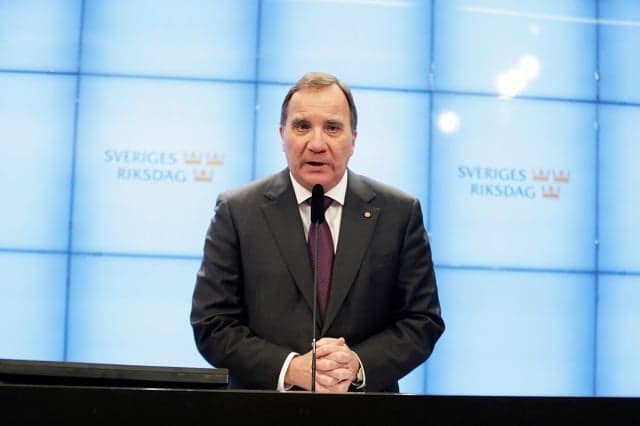Stefan Löfven defeated in parliamentary vote

The leader of Sweden's centre-left Social Democrats was rejected by parliament for the role as prime minister on Friday.
A total of 200 MPs voted against Stefan Löfven as prime minister, 116 voted in favour and 28 abstained.
It is now over three months since Sweden voted in a general election that left neither of the two main blocs with a majority.
Löfven had put forward a proposal for a government made up of his Social Democrats and the Green Party, the same coalition that has governed since 2014.
SURVEY: The winners and losers in Swedish politics
Technically, a PM candidate does not need a majority of parliament to vote in their favour in order to be accepted, but if a majority vote against, the proposal will fail. This system, called 'negative parliamentarism', allows minority governments to rule thanks to abstentions or 'passive support'.
The Social Democrats and Greens voted for Löfven and the Left Party abstained.
However, the five remaining parties in parliament (the far-right Sweden Democrats and the four Alliance parties: Moderates, Christian Democrats, Centre Party and Liberals) all voted no.
Löfven was ousted after the election in a confidence vote, and since then has been running a caretaker administration while the parties have gone through several rounds of talks to try to compromise on a government proposal.
At the end of November, he was given a mandate by the speaker to try to form a government that could be tolerated by parliament, and a vote on installing Löfven as PM was scheduled. This is the second out of four possible PM votes which can be held before a snap election is forced: centre-right Moderate Party leader Ulf Kristersson became the first PM candidate to be rejected by parliament in mid-December.
Löfven's talks with the Centre Party and Liberals -- whose support or abstention in the vote would have allowed the Social Democrats to govern -- broke down when both parties said they would vote no. However, the Liberals said they would have been prepared to abstain had the Centre Party not decided to vote no.
TIMELINE: Everything that's happened in Swedish politics since the elections
Comments
See Also
A total of 200 MPs voted against Stefan Löfven as prime minister, 116 voted in favour and 28 abstained.
It is now over three months since Sweden voted in a general election that left neither of the two main blocs with a majority.
Löfven had put forward a proposal for a government made up of his Social Democrats and the Green Party, the same coalition that has governed since 2014.
SURVEY: The winners and losers in Swedish politics
Technically, a PM candidate does not need a majority of parliament to vote in their favour in order to be accepted, but if a majority vote against, the proposal will fail. This system, called 'negative parliamentarism', allows minority governments to rule thanks to abstentions or 'passive support'.
The Social Democrats and Greens voted for Löfven and the Left Party abstained.
However, the five remaining parties in parliament (the far-right Sweden Democrats and the four Alliance parties: Moderates, Christian Democrats, Centre Party and Liberals) all voted no.
Löfven was ousted after the election in a confidence vote, and since then has been running a caretaker administration while the parties have gone through several rounds of talks to try to compromise on a government proposal.
At the end of November, he was given a mandate by the speaker to try to form a government that could be tolerated by parliament, and a vote on installing Löfven as PM was scheduled. This is the second out of four possible PM votes which can be held before a snap election is forced: centre-right Moderate Party leader Ulf Kristersson became the first PM candidate to be rejected by parliament in mid-December.
Löfven's talks with the Centre Party and Liberals -- whose support or abstention in the vote would have allowed the Social Democrats to govern -- broke down when both parties said they would vote no. However, the Liberals said they would have been prepared to abstain had the Centre Party not decided to vote no.
TIMELINE: Everything that's happened in Swedish politics since the elections
Join the conversation in our comments section below. Share your own views and experience and if you have a question or suggestion for our journalists then email us at [email protected].
Please keep comments civil, constructive and on topic – and make sure to read our terms of use before getting involved.
Please log in here to leave a comment.